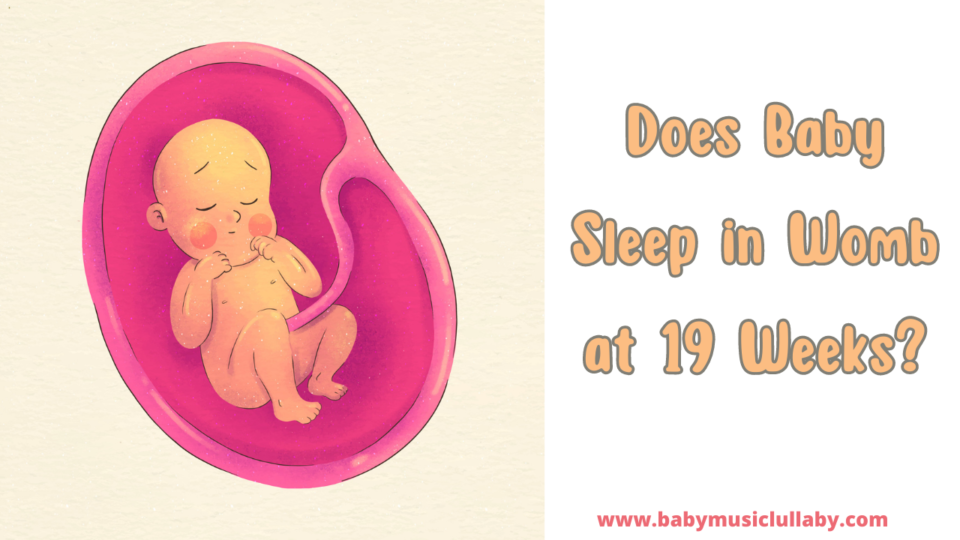Contents
Introduction
The journey of pregnancy is a miraculous experience filled with wonder and excitement. As your baby grows inside the womb, you may find yourself wondering about various aspects of their development, including their sleep patterns. At 19 weeks, your little one has reached a significant stage in their development, and it’s natural to question, “Does baby sleep in the womb at 19 weeks?” This article aims to shed light on the slumber patterns of a developing fetus at this stage, offering valuable insights into their growth and well-being.
Does Baby Sleep in Womb at 19 Weeks? Understanding Fetal Sleep
At 19 weeks of gestation, your baby does indeed sleep in the womb. Just like in earlier weeks, fetal sleep involves rapid eye movement (REM) and non-rapid eye movement (NREM) phases, resembling the sleep cycles experienced after birth. These sleep cycles are vital for the baby’s brain development and overall growth.
The Nature of Fetal Sleep
Fetal sleep at 19 weeks is characterized by periods of REM and NREM sleep. The REM phase is particularly important for brain development and plays a role in memory consolidation and learning. The sleep-wake patterns of the fetus are still developing, and they may experience varying levels of activity and rest during this stage.
Sleep-Wake Patterns at 19 Weeks
Around 19 weeks, your baby starts to develop more defined sleep-wake patterns. While they may not have a fixed sleep schedule like adults, you might notice specific periods of increased activity followed by rest. These patterns are influenced by various factors, including the mother’s activities, external stimuli, and the baby’s growth and development.
Influence of Maternal Activities on Fetal Sleep
Studies suggest that a mother’s activities can influence the sleep patterns of the fetus. When a mother is active or engaged in physical activities, the rhythmic motion may lull the baby to sleep. Conversely, when the mother is at rest, the absence of movement may allow the baby to wake up and become more active.
Soothing Sounds in the Womb
The womb is not a silent place for the baby. Inside the womb, the baby can hear various sounds, such as the mother’s heartbeat, the rushing of blood, and even external noises. Some experts believe that soothing sounds can help calm the baby and promote sleep during pregnancy.
Dreaming in the Womb?
One intriguing question is whether babies dream during fetal sleep. While there is no concrete evidence to support this, some experts believe that dreaming might be possible, given the brain activity observed during the REM phase. However, the true nature of dreams in the womb remains a subject of ongoing research and debate.
FAQs About Fetal Sleep
- Can I Feel My Baby’s Movements While They Sleep at 19 Weeks?
- Feeling your baby’s movements at 19 weeks may not be as pronounced as it will be in later stages, but some mothers might still feel gentle flutters or quickening.
- How Long Do Babies Sleep in the Womb at 19 Weeks?
- Babies do not have a structured sleep schedule like adults. They sleep and wake in cycles, which can vary in duration.
- Can My Stress or Emotions Affect My Baby’s Sleep in the Womb?
- It is believed that a mother’s stress or emotions can influence the baby’s behavior, including sleep patterns. Practicing relaxation techniques may be beneficial for both mother and baby.
- Is Fetal Movement During Sleep Normal?
- Yes, fetal movement during sleep is normal and should not be a cause for concern. It indicates that your baby is growing and developing.
- Are There Recommended Sleeping Positions for Pregnant Mothers?
- As pregnancy progresses, sleeping on the left side is often recommended to improve blood flow to the baby and the uterus.
- Should I Be Worried if My Baby Is More Active at Night?
- It is normal for babies to have periods of increased activity, which can occur more frequently at night. However, if you notice a sudden increase or decrease in movement, consult your healthcare provider.

Conclusion
As we explore the fascinating world of fetal development, we confirm that babies do sleep in the womb at 19 weeks. The REM and NREM phases of fetal sleep are essential for their brain development and overall well-being. As expectant parents, it’s crucial to embrace this incredible journey of pregnancy and nurture a loving connection with your growing baby. Understanding fetal sleep and responding to your baby’s movements can help create a strong bond that will continue to grow after they arrive in the world.
So, cherish every moment of this miraculous experience, knowing that your baby is sleeping peacefully in the safety of your womb.

 Subscribe to Get Soothing Lullabies to Help Your Baby to Sleep
Subscribe to Get Soothing Lullabies to Help Your Baby to Sleep